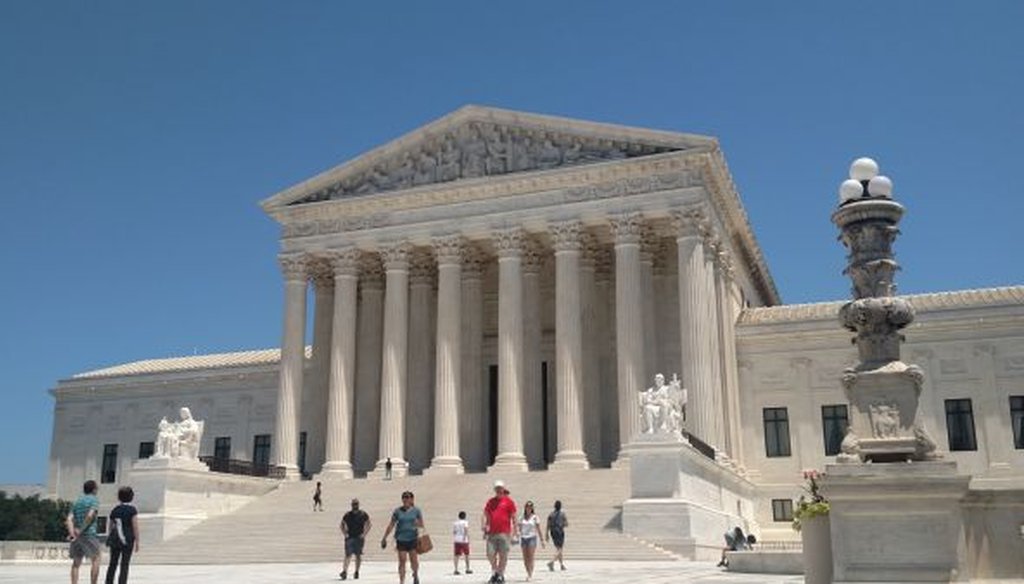

Our only agenda is to publish the truth so you can be an informed participant in democracy.
We need your help.


The Supreme Court in Washington, D.C. (Louis Jacobson, PolitiFact)
Democrats are using a court decision on their hard-fought financial industry watchdog to raise red flags about President Donald Trump’s Supreme Court pick.
U.S. Sen. Amy Klobuchar, D-Minn., said Brett Kavanaugh wrote an opinion opposing the Consumer Financial Protection Bureau.
"Serious concerns I have about Judge Kavanaugh in addition to the obvious health care & separation of power issues: He ruled that the Consumer Financial Protection Bureau was unconstitutional (reversed by full Circuit Court) & went out of his way to dissent against net neutrality," Klobuchar tweeted on July 9.
Sen. Elizabeth Warren, D-Mass., made the same claim in a tweet. We wondered whether Kavanaugh had indeed ruled the CFPB was unconstitutional. Largely, yes.
The bureau has stirred controversy from the start.
Warren was an early advocate for the CFPB and was considered the likely first head until a potential appointment was opposed by Republicans in Congress. Obama’s second choice, Richard Cordray, was also kept from taking office, until Obama sidestepped GOP lawmakers by making a recess appointment. Cordray was later confirmed with some bipartisan support in 2013. (Cordray is now running for governor in Ohio.)
Unlike most federal agencies, the bureau does not rely on appropriations for its funding. The bureau’s operating budget comes from the Federal Reserve and does not require congressional approval.
The CFPB is headed by a single director with a five-year term who cannot be fired at will. The president may only remove the director for "inefficiency, neglect of duty, or malfeasance in office," according to the law that established it.
After CFPB imposed a $109 million fine on PHH Corp., the New Jersey mortgage service provider sued, challenging the constitutionality of the CFPB.
In 2016, the D.C. Court of Appeals sided with the company and cleared the fine. Kavanaugh, one of the three judges, wrote the opinion. Kavanaugh wrote that the CFPB is "unconstitutionally structured."
The structure, Kavanaugh argued, gives the CFPB director more unilateral authority than anyone in the government besides the president.
In order to remedy the constitutional flaw, Kavanaugh wrote, Supreme Court precedent dictates a "narrower remedy" than shutting down the entire CFPB. Kavanaugh suggested allowing the president to supervise, direct and fire the director at will. That’s not exactly the same thing as finding the CFPB itself to be unconstitutional, but it’s close, law experts told us.
A later decision by the Court of Appeals for the District of Columbia Circuit upheld CFPB’s constitutionality. The question could still come to the Supreme Court.
Aaron Klein, the policy director at Brookings Institution’s Center on Regulations and Markets, said that tying CFPB directly to the president, and thus election cycles, could curb its intended independence.
"Reducing the independence of any financial regulator is likely to make them pursue less politically unpopular activities, like reining in credit practices during good times," he said. "That’s why financial regulation tends to only pass Congress after crises, and as the memory of the crisis fades, deregulation comes in."
Klobuchar said Kavanaugh "ruled that the Consumer Financial Protection Bureau was unconstitutional (reversed by full Circuit Court)."
In 2016, Kavanaugh wrote the opinion for a three judge panel of the D.C. Circuit finding the CFPB structurally unconstitutional. The issue lay in the bureau’s leadership structure, not the bureau itself. That said, a change to its leadership structure could rein in the regulatory activities CFPB performs.
We rate this statement Mostly True.
CADC.USCourts.gov, PHH Corporation vs. Consumer Financial Protection Bureau, Oct. 11, 2016
Vox, Consumer advocacy groups are extremely worried about Brett Kavanaugh, July 11, 2018
Twitter, Amy Klobuchar, July 9, 2018
Twitter, Elizabeth Warren, July 10, 2018
Phone interview with Kirsten Hartman, Klobuchar spokeswoman, July 24, 2018
Phone interview with Aaron Klein, policy director at Brooking Institution’s Center on Regulations and Markets, July 24, 2018
Phone interview with Saikrishna Prakash, professor at University of Virginia School of Law, July 24, 2018
Email interview with Sarah Duggin, professor at Columbus School of Law, July 24, 2018
Email interview with Brenden D. Soucy, associate with Levine Kellogg Lehman Schneider & Grossman LLP, July 24, 2018
Email interview with Kathleen Clark, professor at Washington University Law, July 24, 2018
In a world of wild talk and fake news, help us stand up for the facts.
